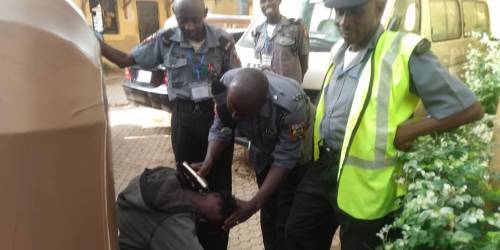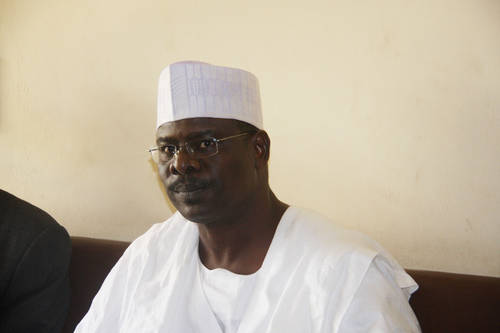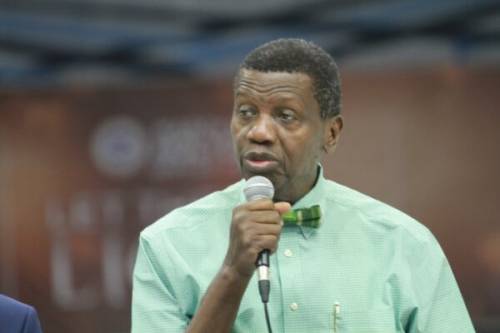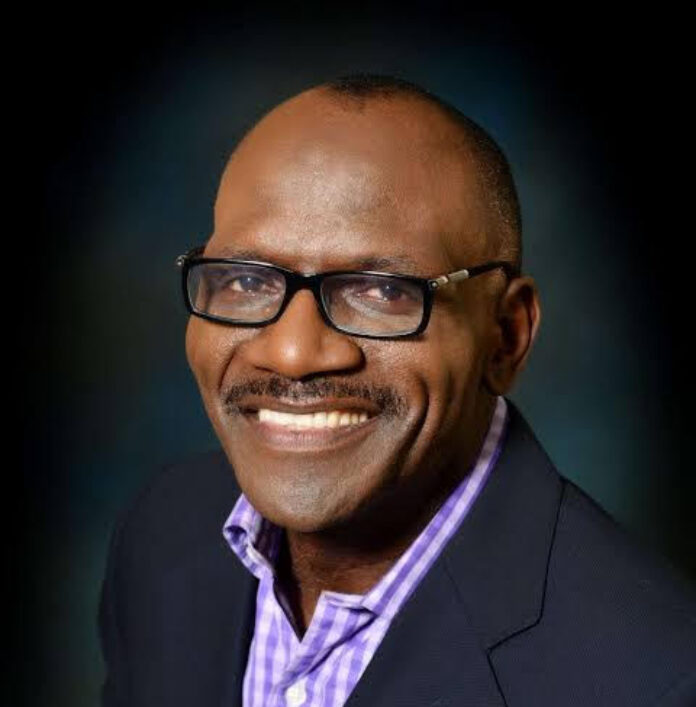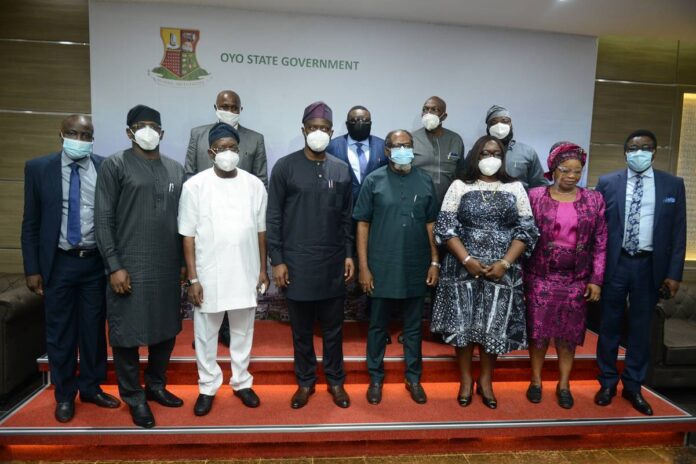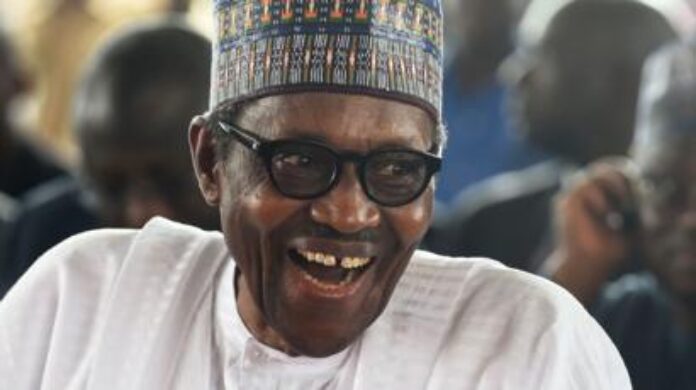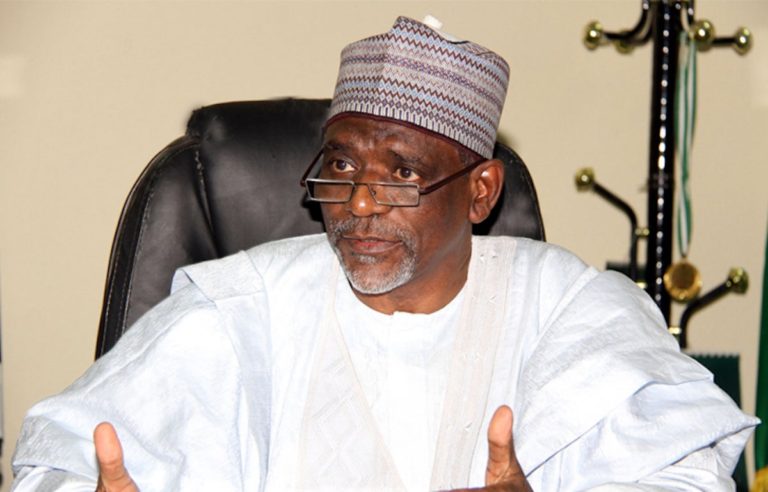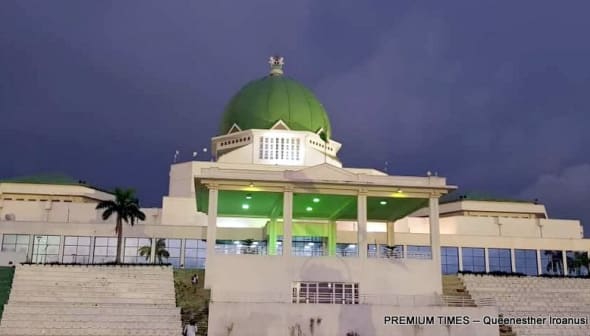









 SAHARAREPORTERS
SAHARAREPORTERS
REVEALED: Senator Ali Ndume Submitted Forged Documents To Bail Maina From Prison
Maina, who is standing trial on a 12-count money laundering charge filed by the Economic and Financial Crimes Commission, was admitted to bail in the trial presided over by Justice Okon Abang of the Federal High Court, Abuja.
Senator Ali Ndume has submitted fake and forged documents to perfect the bail of former Chairman of the Pension Reform Task Team, Abdulrasheed Maina, from prison.
Maina, who is standing trial on a 12-count money laundering charge filed by the Economic and Financial Crimes Commission, was admitted to bail in the trial presided over by Justice Okon Abang of the Federal High Court, Abuja.
Maina was initially admitted to bail in the sum of N1bn with two sureties in like sum.
Both sureties must be serving Nigerian senators with no criminal cases before the court and must have fully developed landed property in Maitama or Asokoro district of Abuja.
After being unable to meet his bail term, the judge varied the bail for Maina to produce one senator, who must sign a bail bond in the sum of N500m and accompany Maina to court on every trial day.
Ndume, subsequently agreed to stand surety for Maina but rather than present original documents, he submitted forged documents to the court to perfect Maina’s bail.
According to Global Transparency and Anti-corruption Network, Ndume presented the property documents of a house owned by one Ahmed Lawal, deceiving the court that it was his.
Ndume also presented a forged Irrevocable Power of Attorney on the property, adding that the property in question had previously been forfeited to the government in a separate case.
In a letter written to the EFCC, the anti-corruption network described as “monumental and gigantic fraud” the forging of documents by Ndume for the bail of Maina.
The letter reads, “We wish to bring to your notice that the documents submitted in relation to the property Plot No: 158 Asokoro District bring No 93 Yakubu Gowon Street, Asokoro (subject property) the collateral used for the bail of Abdulrasheed Maina in the above criminal charge are forged and/or fraudulently misrepresented.
“The subject property is the corporate office of Fiscal Responsibility Commission Abuja, a Federal Government agency.
“The subject property is No 93 Yakubu Gowon Street, Asokoro, a property covered by C of O No: 17dew-d743Z-6e31r-e6D2u-10 in the name of Lawal Ahmed, which is forfeited to the Federal Government and handed over to Fiscal Responsibility Commission Abuja, for use as their office and therefore does not in any way belong to Senator Ali Ndume, the bail surety to Abdulrasheed Maina. The presentation of the property by Sen. Ali Ndume as collateral for bail is a gigantic fraud.
“The so called Irrevocable Power of Attorney dated 14, February 2018 that purported to irrevocably appoint Senator Ali Ndume, as the attorney of Lawal Ahmed over the subject property is also a fraudulent document since the property is forfeited to the Federal Government.
“The representation that the so-called Irrevocable Power of Attorney dated 14th February 2018 between Lawal Ahmed and Sen. Ali Ndume is registered at Abuja Geographic Information Services (AGIS) is a fraudulent misrepresentation as no such Power of Attorney has ever been registered at AGIS.”
The group also revealed that the photograph of the property known as Manor Terrace was submitted and fraudulently misrepresented as being Plot 158 Asokoro District covered by the C of O and by the purported Power of Attorney, whereas, Plot 158 Asokoro District is numbered as No: 93 Yakubu Gowon Crescent Asokoro, situated four property blocks away from ECOWAS Secretariat.
The Global Transparency and Anti-corruption Network called for fresh charges to be instituted into the case of Maina and Ndume.
The group raised the alarm that with the presentation of forged documents, Maina could easily abscond the country and flee trial.
“With these monumental fraud and forgeries the court was misled into certifying that Abdulrasheed Maina had fulfilled his bail conditions which led to his release from prison, setting the stage for an imminent flight and disappearance of Maina and making a mockery of the judicial and prosecutorial systems of the nation and above all rewarding impunity and brigandage.
“The enormity and scale of the fraud perpetrated by Abdulrasheed Maina and his accomplices should necessarily lead to fresh criminal charges, apart from the above titled charge for which he is presently being prosecuted.”
Mother Kills Own Children Because Husband Married Second Wife
The woman, it was gathered, stabbed the children many times until they stopped breathing.
jealous housewife in Diso village, Gwale Local Government area of Kano State, Hauwa Aminu, has allegedly killed two of her children over rivalry and because her husband, one Ibrahim Haruna Aminu, married a second wife.
The woman, it was gathered, stabbed the children many times until they stopped breathing.
The incident happened while the husband was staying with his new wife in another house.
A family source said Hauwa had been living with envy and jealousy ever since Aminu married another wife, leading to her killing her own children.
Spokesperson for the Kano State Police Command, Abdullahi Haruna, confirmed the incident.
He said the command was already investigating the situation. (saharareporters)
Enemies Of Nigeria Manufacturing Weapons For Terrorists, Borrowing Us Money We Cannot Repay —Pastor Adeboye
The cleric made the comments at a service to mark Nigeria’s 60th independence anniversary at RCCG headquarters, Throne of Grace, Ebute-Metta, Lagos
Pastor Enoch Adeboye, General Overseer of The Redeemed Christian of God, has said that the enemies of Nigeria were those who manufacture weapons and gave to people perpetuating attacks around the country.
The cleric made the comments at a service to mark Nigeria’s 60th independence anniversary at RCCG headquarters, Throne of Grace, Ebute-Metta, Lagos.
Pastor Enoch Adeboye, General Overseer of The Redeemed Christian of God, has said that the enemies of Nigeria were those who manufacture weapons and gave to people perpetuating attacks around the country.
He added that certain nations were deliberately befriending Nigeria with the intent to sponsor terrorism and provide loans that would be difficult to repay by the country.
He said, “There are some people buying weapons for those that are carrying guns who are causing havoc here and there and there are also some nations that are befriending our nation that are not truly our friend, who want us to borrow money so much that we would not be able to repay, knowing fully well that an average borrower would be the servant of the lender as long as he remains a debtor.
“These enemy nations manufacture guns, bullets and rejoice when we have problem so that we can come and buy guns and bullets to kill our people. Every terrorist and every sponsor of terrorists in Nigeria would not see the New Year.
“If not for God, what will Nigeria be saying now? The experts expect us to be dying like chicken but God did not allow it to happen.”
He added that certain nations were deliberately befriending Nigeria with the intent to sponsor terrorism and provide loans that would be difficult to repay by the country.
He said, “There are some people buying weapons for those that are carrying guns who are causing havoc here and there and there are also some nations that are befriending our nation that are not truly our friend, who want us to borrow money so much that we would not be able to repay, knowing fully well that an average borrower would be the servant of the lender as long as he remains a debtor.
“These enemy nations manufacture guns, bullets and rejoice when we have problem so that we can come and buy guns and bullets to kill our people. Every terrorist and every sponsor of terrorists in Nigeria would not see the New Year.
“If not for God, what will Nigeria be saying now? The experts expect us to be dying like chicken but God did not allow it to happen.” (saharareporters)
OPINION | The Promise of Independence, By Taiwo Odukoya
I will make you a great nation, and I will bless you, and make your name great; and so you shall be a blessing – Genesis 12:2
There are many ways in which Nigeria is a miracle.
With the unique distinction of being the most populous black nation on earth, she is a confederation of cultures and languages, religions and dreams; a country that has survived colonialism and a civil war, draconian dictatorships and doomsday predictions and one, which in spite of her deep-seated challenges, has contributed so much to the African continent and to the world. She is a country still full of promise 60 years since she wrested herself from colonial rule.
The truth is, nations are products of promises, conceived by the collective desire to build systems and structures that guarantee the fulfilment of individual potential. Former US president Barack Obama captured it quite well when speaking of the promise of the American nation. “Tonight, we gather to affirm the greatness of our nation – not because of the height of our skyscrapers, or the power of our military, or the size of our economy. Our pride is based on a very simple premise, summed up in a declaration made over two hundred years ago,” he said.
The promise of Nigeria, in many ways, is what has kept us together and driven us forward against all odds. Fraught with difficulties as our journey has been, we are grateful to God that we are still here, still with hope, working to build the country of our dreams. Congratulations, Nigeria! Happy Independence Day! But as we celebrate, we must also reflect.
The psalmist reminds us to “number our days that we may apply our hearts to wisdom” (Psalm 90:12). Moments like this afford us a chance for introspection, to celebrate and strengthen what is good, and also to face up to our mistakes, learn from them and course correct. Many may argue, with good reason, thatNigeria has hardly lived up to its potential. Like the biblical children of Israel, we have circled the same mountains for too long.
A recent survey by the United States Institute for Peace on how the state of insecurity in the country is affecting the government’s coronavirus response shows that roughly six in 10 respondents across several states have experienced insecurity or violence in the last 12 months. Sixty years after independence, it is most unfortunate that Nigerians still do not feel safe within their own borders.
In 1987, violence erupted in the College of Education, Kafanchan in Kaduna State, where Christians were attacked by Muslims over an alleged misrepresentation and interpretation of the Quran. Hundreds of people were killed. In 2020, in the southern part of Kaduna, violent attacks and conflict have again left scores dead and many families bereaved, a perennial cycle of violence that has claimed thousands of lives since 1980. Boko Haram, armed bandits, kidnappers and suspected Fulani herdsmen continue to be on the rampage, wreaking havoc, across the northern part of the country, with incursions in the southern part. The question is: What have we done to genuinely stem this ugly tide? What have we learnt from our mistakes?
This despondent state of affairs has further widened the chasm of mistrust between the leadership and the people. The Bible tells us that hope deferred makes the heart sick, which is why a promise, in the context of nationhood, cannot go unrealised in perpetuity without irreparable repercussions.
There is an urgency to get things right; we can no longer afford to ignore or overlook the problems that seek to tear us apart. We, therefore, make a desperate call to leaders in every strata of society, particularly those at the helm of affairs, to fix Nigeria. And the time to do it is now. As we bask in the euphoria of patriotism that attends the Independence Day celebrations, let us remember that the greatest act of patriotism we can demonstrate is to serve, within the purview of our respective offices, with competence and integrity, with a renewed determination to leave no one behind, ethnicity or religion regardless.
The words of Franklin D. Roosevelt continue to ring true: “In our personal ambitions we are individualists. But in our seeking for economic and political progress as a nation, we all go up or else all go down as one people.”
As a country, we can go up. We have the potential to. One of the greatest tragedies of human existence will be for Nigeria to fail. We cannot let that happen. No, not on our watch! As Tafawa Balewa, speaking at Nigeria’s independence ceremony exactly 60 years ago, said, “I promise you, we shall not fail for want of determination.”
We look forward to many more years of celebration, together, stronger and more prosperous, each one playing his or her part.
Nigeria has a great future. Please let it be!
*Taiwo Odukoya is the senior pastor of The Fountain of Life Church, Ilupeju, Lagos.
Shell’s Gas to Boost Industrialisation in Oyo
*Company awards contract for Bayelsa
(News Release)
Shell Nigeria Gas (SNG) is to facilitate domestic gas infrastructure development in Oyo State following the signing of a Memorandum of Understanding with the state government last week. The pact targets the distribution of cleaner and more reliable gas energy to industries in the state through a distribution network with potential for around 50 million standard cubic feet of gas per day, starting from the state capital, Ibadan, as the point of first entry.
The MoU set out broad terms and conditions to guide co-operation between the two parties for the project development and delivery, and it was signed at the Oyo State Government House last Wednesday by Managing Director of SNG, Ed Ubong and the state governor, Oluseyi Makinde.
The governor described the agreement with SNG as critical in the state’s efforts to boost industrialisation and enhance economic development while improving access to power for both residential and industrial areas in the state. “We believe that the agreed terms in the MoU will lead to the signing of the Build-Operate-Own-and Transfer agreement so that businesses can begin to reap the benefits of a steady source of energy.”
SNG’s Managing Director, Ed Ubong said, “The partnership is an opportunity to further improve domestic gas utilisation in Nigeria, enabling local industries to thrive and create employment opportunities for Nigerians.”
In another development, SNG has commissioned an indigenous contractor, Gredor Nigeria Limited, to begin the construction of the gas pipeline infrastructure to deliver gas to the Nigeria Content Development and Monitoring Board Industrial Park in Polaku, Bayelsa State. SNG had earlier in the year acquired the lease of one hectare of land in Polaku for the gas project which will supply gas for industries in the park and the environs. The project is expected to be delivered within six months.
Ubong said the Polaku project would boost industrialisation in Bayelsa State and provide employment opportunity for skilled and unskilled local population in addition to directly improving internally generated revenues in the state.
He said, “The project will increase the over 150 industrial and commercial customers in Nigeria who currently receive SNG’s supply of natural gas through gas infrastructure that we have built with our partners and local stakeholders.”
Responding to the rapid expansion of SNG as distribution network, Country Chair, Shell Companies in Nigeria, Osagie Okunbor said Shell was positioned to continue to optimise its onshore footprint while investing in gas. “For more than 50 years, Shell has been in the forefront of the campaign to develop and monetise Nigeria’s huge gas resources. SNG continues to demonstrate leadership in this space, growing the domestic gas market and also helping to improve lives in every state it operates.”
SNG recently completed 20 kilometres domestic gas pipeline expansion project in Abia State, connecting Agbor Hill, Osisioma and Ariaria industrial zones. The expansion project has enabled the supply of pipeline gas to Ariaria Market Energy Solutions Limited, the Independent Power Project (IPP) consortium that provides electricity to the popular Ariaria market in Abia State. Ariaria International Market is one of the largest leather shoe-making and open stall markets in West Africa, with over 37,000 shops and an estimated one million traders. (metrowatchonlin)
Buhari Gives Teachers Special Salary Scale, Raises Their Service Year to 40 Years
By Funmilayo Adeyemi
President Muhammadu Buhari has approved a special salary scale for Nigerian teachers while also increasing the years of service from 35 years to 40 years.Buhari, who was represented by the Minister of Education, Malam Adamu Adamu made this known in Abuja during the occasion of the 2020 World Teacher’s Day.The theme of celebration ” Teachers: Leading in Crisis Reimagining the Future”captures the resilience of Teachers and school administrators globally amidst the COVID-19 pandemic.Buhari instructed the ministry to facilitate the implementation of the new teachers salary scheme saying this will encourage the teachers in delivering better service.According to him, teachers have the power to shape and reshape the lives of young people and help learners to enhance their potentials.” Only great teachers can produce excellent people and students that will make the future of our country great.”A positive or negative influence of teacher on any child will have effect on that child. Therefore the federal government is ensuring quality education to access” My administration has resolved that quality education of teachers in terms of engagement of continued professional development has to be given priority.” The future of this country will be a function of quality education delivered to our children today and this depend on the quality of our teachers and the quality of our teachers depend on the motivation and their motivation depends on how happy they are doing what they are doing.” To address these challenges, my administration has approved the following for teachers and the teaching profession. That in order to attract investment in the teaching profession, the quality of the introduction of bursary award has been restored.“There will be a special pension scheme to enable the teaching profession retain its experience talent as well as extend teachers retirement age to 65 years and the duration of teachers years to 40 years.” And that is to create a career path policy for the teaching profession in Nigeria and gives speedy teachers to programme and ICT training.He added that his administration had also approved the building of low cost housing for teachers in rural areas, the sponsorship of teachers, prompt payment of salary and timely promotion of teachers to eliminate stagnation.He said this would motivate and restore the lost glory of teachers and teaching in the country.Meanwhile, the Minister of State for Education, Mr Chukuemeka Nwajuiba identified the teaching profession as the greatest profession in the world which must be accorded adequate recognition and respect.Nwajuiba noted that the picture of a Nigerian teacher in the 1960s and 1970s which connotes discipline needed to be replicated in today’s profession.According to him, having a day to celebrate the teacher is just but a token gesture of recognition to the sacrificial contribution of teachers.” In those days, very comfortable and important figures in the society would send their children to a teacher’s house for grooming. That was the teacher then.” Teacher’s children and those that lived with them became the crème de la crème of the society. The society sadly have tilted towards ephemeral appearances that negates the standard of teachers as role models.” We think this should stop. Teachers deserve recognition and respect. The first step is to have qualified teachers in practice.” That is why the ministry through the Teachers Registration Council is making concerted efforts to withdraw unqualified teachers from the classroom nationwide,” he said.The minister however urged individuals, states and local government education authorities and corporate organisations to replicate reward system in order to institutionalise productivity in the education sector.Meanwhile, Mr Sonny Echono, Permanent Secretary, Federal Ministry of Education commended the enduring selfless devotion of all teachers across the federation especially those in crisis thorn and remote areas for their invaluable contribution to the development of education.” I also wish to appreciate UNESCO for its recommendation to all nations to dedicate the 5th of October of every year as the special day to remember the signing of the standard setting instrument on the status of teachers and also extol their virtues.” To the individual, who has enjoyed the privilege of being taught by a teacher, I urge you to always remember to appreciate that special teacher who laid the foundation for the success you have achieved in life.”News Agency of Nigeria (NAN) reports that the celebration witnessed awards of Best School Administrator, Best Teacher in Public School, Best Teacher in Private School, among others.(NAN)
FG, States Lose N1.2 Trillion To 19 ASUU Strikes
By John Onah, Abuja
The Federal and state Governments, proprietors of public universities in the country, may have lost a whooping N1.2 trillion to the incessant strikes embarked by the Academic Staff Union of Universities(ASUU) since the nation’s return to democracy in 1999, investigation by DAILY ASSET has revealed.
The amount, according to data compiled from various sources in the course of the month-long investigation, represents the salaries paid to staff in the university system for a cumulative period of about four years during which ASUU went on strikes in the last two decades.
ASUU, which is currently on strike since March 9, had gone on strike in each year in the last 21 years with rare exception of 2014 and 2015, when the university lecturers did not go on strike, the data showed.
The academic staff in all of the nation’s public universities went on a strike for a total of 19 times with a cumulative period of about 1, 437 days, a few days short of four cumulative years, the data showed.https://galleria.com.ng/pushgalleriaads?q=201&i=59&ho=dailyasset.ng
An analysis of the timelines of strikes by Universities in Nigeria showed that the on-going strike, which started on March 9, with a two-week warning and the indefinite strike, which commenced on March 29 is the longest in the history of ASUU strikes as it has lasted for about 200 days as at September 30 and still counting.
Before then, the strike in 2003, which snowballed into 2004 was the longest as it lasted 180 days, the analysis showed.
It was also observed that some of the strikes dovetailed into a new year like in 2003, which ended in 2004 and 2011, which also ended in 2012.
DAILY ASSET investigation showed that the over N1.2 trillion lost by the Federal and state governments represented total emoluments paid to the staff during the period the strikes lasted, obviously for work not done, as the Federal Government never invoked the provisions of the extant labour Act, which has provisions for “No work, No pay”.
The amount covered the payment of staff in 43 Federal and 47 state universities, where the workers are unionized.
However, the staff of the nation’s 78 private universities are mostly not unionized and were not part of the numerous ASUU strikes, investigation showed.
The latest available data on payment of salaries in Nigerian Universities provided by the National Universities Commission(NUC)Statistical Digest 2018 released in April 2019, showed that the Federal and state Governments committed a total of N308.5bilion(N308, 526,701, 478.39) to payment of salaries.
The figure did not include Rivers State University, University of Ilorin, University of Jos and Yobe State university, which for undisclosed reasons were not covered in the
Statistical computation released by NUC.
The amount lost to the strikes was arrived at after DAILY ASSET in-house Statisticians used the annual payment of N308.5bn as an average and multiplied by about four years of strikes by the university lecturers.
Data obtained from NUC and Office of the Accountant General of the Federation showed that the least paid university lecturer earns N1,979,640 per annum, while a Senior Lecturer earns about N3,091,505.
Similarly, a Reader or Associate Professor earns at least N3,768,221 per annum while a full Professor earns N5,004,750 per annum.
It was found out that the Federal and state universities had a total of about 51,000 academic staff in 2017 but the figure may have risen to at least 61,000 in 2020 even though NUC statistical data is yet to formally report on the number of staff in the universities in the years after 2017.
President of ASUU, Prof Biodun Ogunyemi, has however, justified the numerous strikes by university lecturers as he said the strike action has helped the educational sector.
“You need to look so far over years what the strike has achieved for the Nigerian education sector and compare it to what is happening in other sub-sectors of the educational system. If not for ASUU, the public universities, in fact, public tertiary education would have collapsed totally beyond recovery.
“So you can best appreciate that when you compare and contrast what is happening as a result of ASUU struggle and what is not happening as a result of lack of struggle at the level of primary and secondary education of the country”, he told an online news platform, The Cable CamPulse.
The President said Nigerians should appreciate the lecturers for the strikes.
“They are not concerned with the plight of the poor. All you see now is how to fit their children into positions of advantage to the disadvantage of the children of the poor,” he said.
“The best way to do it is to ensure that their children receive the best of education while the children of the poor are subjected to substandard and low-quality education.
“NUT cannot do what ASUU is doing now because the government will seize their salary, they have underpaid them, they have not given them the right to ventilate their anger. And because of that, they have become disillusioned in places where they are working.
“You will even see primary school teachers who cannot see take their own children to the school they are teaching. I’m saying these just to illustrate the fact that public primary and public secondary education system have been collapsed. If not for ASUU the same would have happened.
“So Nigerians should actually be thanking ASUU, for the wake-up calls we always give the Nigerian government.
“And let me tell you as far back as 1992, each time we went for an action, we refer government to inject funds so that public universities will not go on the same place with primary and secondary schools. In 1992, it’s as a result of ASUU struggle that government introduced TETFUND.
“TETFUND today is the only source of providing infrastructural amenities in Nigerian Universities. So people who are ignorant are the ones saying we are destroying calendar,” he told The Cable CamPulse.
_________________________________
Timeline of Strikes by ASUU since 1999:
1999 – 150 days
2001 – 90 days
2002 – 14 days.
2003 – 180 days (ended in 2004)
2005 -3 days
2006- 7 days
2007 – 90 days
2008 -7 days
2009- 120 days
2010- 157 days
2011—90 days(started in December and ended in 2012)
2013- 157
2014- None
2015-None
2016- 7 days
2017- 35 days
2018- 60 days
2019-90 days
2020-180 days and counting as at Sept 4.
1,437=3.9YEARS (dailyasset)
Anger brews over N44 billion for federal lawmakers in 9 months; Niger Senator explains N50 million spending
An almost innocuous revelation by a federal lawmaker in the House of Representatives, Hon. Simon Karu, representing Kaltungo/Shongom federal constituency of Gombe State that House members take home N9.3 million monthly is eliciting behind-the-scene rage from his colleagues, while other knowledgeable Nigerians are angry that N32 billion may have been paid out to federal lawmakers in the last nine months, including the months Covid-19 ravaged the country.
Karu said the N9.3 includes monthly salary of N800, 000 and an additional N8.5m as office running costs.
At an Independence anniversary lecture, ‘Fix Nigeria @60’, in Abuja, Karu, heaped blame on constituents of lawmakers. “The official salary of a member, House of Representatives which I also receive monthly is N800, 000. I told you I was going to say it. Why don’t you wait for me to say it? The office running cost of a member of the House of Representatives is N8.5m. Those of you who know, know that I said exactly what it is. The problem is what the constituents demand and when you don’t meet, they begin to call you names.”
“Just before I walked to the stage, I received three emails from my constituents demanding for money and demanding for jobs, when you don’t respond, it becomes an issue”, Karu said.
Recall that in the last Senate, Kaduna Central lawmaker, Senator Shehu Sani, drew the ire of his colleagues when he went public that he and others in the Upper House of the National Assembly got N13.5 million. With an additional N900,000, it means Senators were, and still, get N14.4 million.
For 109 Senators in a month, the figure is 1,569,600,000 per month, while House of Reps member, 360 in all, get N3,348,000,000 monthly. In nine months, the lawmakers in both Houses would have got about N44 billion.
Response to Karu’s indiscretion was fast and swift. Chairman of the House Committee on Treaties, Agreements and Protocols, Ossai Nicholas Ossai, repudiated Karu’s position, putting him down at the same event.
Said he: “I have never received such a salary since I came to the National Assembly and I have been in the National Assembly before him.”
Many did not believe Ossai, but other lawmakers are quietly going after Karu’s jugular for spilling the beans on them.
Meanwhile, a former Senator from Niger State, David Umaru, has debunked a report alleging that he diverted and embezzled N50million meant for the renovation of some schools in his constituency in 2018.
Reacting, Umaru boasted that no Senator before or after has matched what he did in terms of education for his constituents, adding that the story was done to embarrass and tarnish him.
He said that the money meant for the renovation of eight blocks of three classrooms in some local government areas of Niger East Senatorial District was used judiciously beyond budgetary provisions because he was very interested education of youths in his constituency.
In addition, he says he sponsored 10 law students annually with full scholarship paid.
Moreover, he disclosed that 77 undergraduate students in Nigerian universities were on his payroll with full scholarship “I also have 66 secondary students across unity schools in the country with full scholarships and many other interventions”, he said.
He adds, “I have being struggling to ignored or to respond to this “funny journalism” with no iota of professionalism, because this publication was done without due regards to research or investigation. It is a paid Job meant to tarnish my image.
“However, I made bold to say that when it comes to constituency projects, you can hardly find a Senator in the state that has done what I did during my time as a senator.
“Specifically I have taken constituency projects quite seriously during my time as a Senator and in fact in most cases I go beyond the budgetary provision to ensure that such projects are completed”.
“Usually when provisions are made in the budget, it is not the whole amount that is released to the supervisory agency, usually it is 70 percent but in this particular case 70 percent was released but the work I did was 95 percent completed.
“That is why I found this publication so funny. The projects are there and very visible across the seven local government areas for everybody to see.
“it is funny for someone to allege that I embezzled N50 million meant for the renovation of schools in my constituency when I have in several instances gone beyond budgetary provision to get these projects done.
“I didn’t go to the Senate to be rich, that was not my intention, I went there to serve my people which I did to the best of my ability. I can say it boldly that I did credible well as a Senator representing Niger East Senatorial District, so I see this publication as a paid job to rubbish me”. (everyday)
Independence Anniversary Speech: Remembering Ubulu-Uku’s Obi Ofulue III
With the uncountable problems facing Nigeria at present, one would have expected President Muhammadu Buhari to address all the problematic areas of our polity and assuage the fears of Nigerians.
He is the President for goodness sake, and so he should have used the once-in-a-year opportunity presented by the nation’s Independence Anniversary, to present his best speech for that given year that was rolling away. Also, he should have used the podium to showcase what he, the nation’s chief servant, would do for the populace so that Nigeria would occupy a better position among nations.
Whether or not it is clear to us, Nigeria does not exist in a vacuum; she is locked in a do or die contest with other nations for the control of the world’s resources. And so far, we are in the gutter. Given the way nations function, a nation’s leader leads … and he either leads aright or the nation suffers.
So, which problems did Buhari address in his speech? Which solutions did he proffer? What exactly did he tell Nigerians that he would do? I have searched for such tangibles and came away with nothing – virtually nothing.
Now, may we please interrogate the speech, all the 2,425 words in that speech, from the “Dear Compatriots” opening to the “May God bless you all, and may He continue to bless the Federal Republic of Nigeria” conclusion.
The areas over which the achievement of the government should be judged was not lost on President Buhari. He actually mentioned the issues immediately after his preambles: “In the past four years, the majority of Nigerians have committed to Change for the Better. Indeed, this administration was re-elected by Nigerians on a mandate to deliver positive and enduring Change – through maintaining our National Security; restoring sustainable and inclusive Economic Growth and Development; and fighting Corruption against all internal and external threats.”
So, how well did Buhari score himself on National Security? He said next: “This Change can only be delivered if we are united in purpose, as individuals and as a nation. We must all remain committed to achieving this positive and enduring Change. As I stated four years ago, “Change does not just happen… We must change our lawless habits, our attitude to public office and public trust… simply put, to bring about change, we must change ourselves by being law-abiding citizens.”
What would anyone make of the above paragraph please? Did Mr. President score himself on the topics he, himself listed? No, is the obvious answer. If all it would require to bring about national security is a change in our lawless habits, I am sure that Buhari himself would not have bothered to contest election to become Nigeria’s President. Or have we forgotten that he and his party, made specific promises to end the national insecurity that had become a national shame when former President Goodluck Jonathan in Aso Rock Presidential office? Now that shame has been accentuated. Now, the matter of national insecurity has become a national disaster, not just a national shame.
What is the nature of this wanton insecurity in the land? Buhari’s answer: “In the last four years, we have combatted the terrorist scourge of Boko Haram.” He added: “This clearly demonstrates our commitment to arrest the incidence of armed robbery, kidnapping and other violent crimes across our nation.
We remain equally resolute in our efforts to combat militant attacks on our oil and gas facilities in the Niger Delta and accelerate the Ogoni Clean-up to address long-standing environmental challenges in that region.”
My point is this, if Buhari had the presence of mind to list the “combat militant attacks on our oil and gas facilities in the Niger Delta” as he usually does, why did he refuse to mention the killer herdsmen that have reduced a large swart of Nigeria (the South-South, South-West, South- East and North-Central) into a vast killing field? Why, please someone, tell Nigerians why.
Well, as a Nigerian, I feel duty bound to bring this to Mr. President’s attention: It is a report in THISDAY newspaper of June 7, 2020; “Between 2017 and May 2, 2020, Fulani herdsmen conducted 654 attacks, killed 2,539 and kidnapped 253 people in Nigeria, a report obtained by ThisDay has shown. The report titled, ‘Working Document — Fulani Militias’ Terror: Compilation of News (2017-2020),’ revealed blood-curdling statistics of vicious attacks, deaths and kidnappings by the herdsmen.
It stated that the herdsmen assaults against farmers in Nigeria were “regular, systematic, targeted attacks.”
The author of the report José Luis Bazán, an independent researcher and analyst, based in Brussels, Belgium, said, “Nigerians are suffering widespread and systematic terrorist attacks by, mainly, Boko Haram, the ISIL-aligned Islamic State West African Province (ISWAP), Fulani militias and Ansaru.”
Bazán, however, pointed out: “The Global Terrorist Index 2019 published by the Institute for Economics and Peace, indicates that the primary driver of the increase in terrorism in Sub-Saharan Africa was a rise in terrorist activity in Nigeria attributed to Fulani extremists: in 2018, Fulani extremists were responsible for the majority of terror-related deaths in Nigeria (1,158 fatalities), with an increase by 261 and 308 percent respectively from the prior year.”
The report noted that most of the “Fulani attacks were armed assaults” (200 out of 297 attacks) against civilians (84 percent of the attacks).
So, when will Mr. President recognise this as a special threat that needs a special focus from the security agencies? When?
One major topic that angered Nigerian like nothing before was the so-called Home-Feeding of school children…even when schools had been shut down owing to the Covid-10 pandemic. Huge sums of money have been said to have been spent on it. Yet, incredulous Nigerians have been wondering how on earth could whatever government agency had identified the families of out of school children to benefit from the exercise.
Instead of looking into the grievances of Nigerians that belong to that school of thought, or instead of explaining how such a scheme could have been pulled off when Nigeria has no social and population data that could be useful in anyway, Mr. President, in his Independence speech, gave his imprimatur to the project. Pray, how were the children to benefit from the programme identified? And did he, who spoke very much about anti-corruption in that same speech, determine that all the monies the officials claimed to have been handed out to the needy, actually got to the intended segment of the society?
On this, here is Buhari’s stance and stand: “Our ongoing N500 billion Special Intervention Programme continues to target these vulnerable groups, through the Home-grown School Feeding Programme, Government Economic Empowerment Programme, N-Power Job Creation Programme, loans for traders and artisans, Conditional Cash Transfers to the poorest families and social housing scheme.
“To institutionalize these impactful programmes, we created the Ministry for Humanitarian Affairs, Disaster Management and Social Development which shall consolidate and build on our achievements to date. To the beneficiaries of these programmes, I want to reassure you that our commitment to social inclusion will only increase”.
Poor Nigeria!!! If President Buhari is actually satisfied that government officials were handing out cash instead of making the needed payments through the banks (e-payment). It means he will not even bother to wonder how on earth it will be possible to offer any meaningful evidence of actual disbursement. Beyond all else, he has actually announced in his speech that the outcry over the conduct of the officials involved is neither here nor there.
I wanted to ask why the government has not seen the need to set down a template that should make it very difficult for people to be able to steal government funds, because it is better to make it difficult for people to steal than to keep crying to EFCC and ICPC after the milk has already been spilled. Or has the saying that there is no use crying over spilled milk no longer tenable? I actually wanted to dwell seriously on it but then I saw in the speech what comes next: “We must commit to installing a culture of Good Governance in all we do. This administration has fought against corruption, by investigating and prosecuting those accused of embezzlement and the misuse of public resources. We have empowered teams of prosecutors, assembled detailed databases of evidence, traced the proceeds of crimes and accelerated the recovery of stolen funds.”
Sincerely, nothing about corruption has changed in Nigeria. Corruption will stop when it is difficult for people to steal; that is when impunity has been checked. But how do you check corruption when government officials would come to a place, and begin, in this day and age, to hand out fist full of Naira notes to individuals? How would any meaningful account be ever rendered? And yet, Buhari commended such a Stone Age practice in his Independence Anniversary speech.
And what did Mr. President say about the calls for restructuring the polity, especially by introducing COMMUNITY POLICING? By his deep silence, he could have as well spat on the idea. Instead he spoke about increasing the numerical strength of the Police Force. Hear him: “The Ministry of Police Affairs has been resuscitated to oversee the development and implementation of strategies to enhance internal security. My recent assent to the Nigerian Police Trust Fund (Establishment) Act has created a legal framework to support our Police with increased fiscal resources to enhance their law enforcement capabilities.
These initiatives are being complemented by the ongoing recruitment of 10,000 constables into the Nigeria Police Force. This clearly demonstrates our commitment to arrest the incidence of armed robbery, kidnapping and other violent crimes across our nation.”
Resuscitated? From slumber? And in what ways has the Police Force been resuscitated? Killings and killings, the like of which has never been heard of in Nigeria until the inception of Buhari’s administration, now takes place almost on a daily basis.
A recent report on the insecurity in Nigeria contained this: “In October 2018, President Buhari promised – on a visit to Southern Kaduna, which has seen endless violence over the past decade or more – the Federal Government’s resolve to prosecute the perpetrators. However, locals continue to plead for central government to respond.”
On September 29, the Catholic News Agency reported the release of a Catholic Church Priest who was kidnapped in his farm near Issele-Uku, Delta State. That was the second time the humble priest was kidnapped. Those who kidnapped him the first time were never apprehended. So, should I be confident that those who kidnapped him a second time would be caught and punished? That would be hoping against hope. As you read this, those who met a woman, Wenhana Shaku in her farm, cut off her palm, and left her in a pool of her own blood, have not been apprehended. She is still alive and she said her attackers were Fulani herdsmen. But will she ever get justice?
What about the abductors and killers of the late Obi of Ubulu, HRM Obi Ofulue III? Some persons were paraded as having something to do with the death. A name was mentioned but the faces of those paraded were not shown. I am from Ubulu-Uku town and we are still waiting for justice for the very amiable and gentlemanly Obi Akaeze Edward Ofulue. His blood is still crying for justice. The faith of the town’s folks in Nigeria is still shaky; if the Police can’t solve the murder of a king, who is safe?
The killer herdsmen are the greatest security challenge facing Nigeria today simply because they are everywhere across the nation. Hey, we started with the killer herdsmen, and we have returned to them. Even if the President did not show that he is aware of this particular criminal behaviour of a certain group of persons, this should be the right place to stop this article. This I believe.

